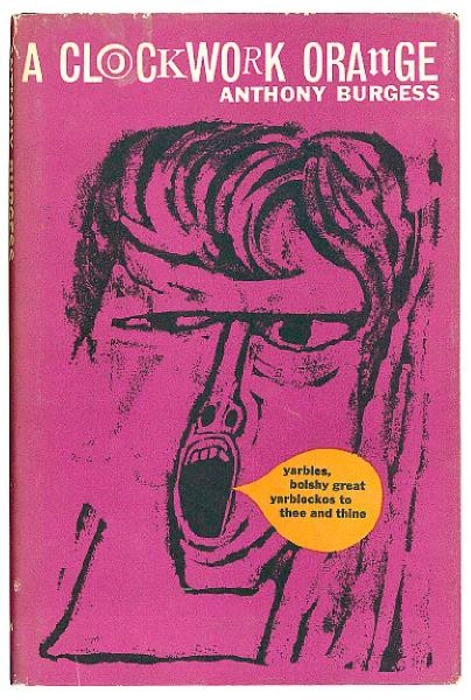Here,
I here republish the first book I completed in Hundred Book Challenge
originally published here on
May 28, 2013.
What’s it going to be then, eh?

This 1962 novella by prolific British
writer Anthony Burgess reads like a bead of water skittering across a
hot skillet.
The story follows our “faithful
narrator” Alex, a 15-year old-gang leader in a vaguely futuristic
and dystopian England. Alex first shows readers a life of crime and
debauchery followed by being institutionalized and “rehabilitated”
by an oppressive government using nightmarish methods to force Alex
to associate criminal behavior with physical sickness- a method that
works, forcing Alex to do good to people rather than evil. The
opposition to the government then attempts to use Alex as a poster
boy for government gone wrong, ultimately sending him on a suicidal
jump out a window before being reverted back to his previous, violent
ways by the government afraid he would become a martyr against the
establishment. The final chapter, excluded from U.S. publications of
the book and the Stanly Kubric movie, shows Alex as a more mature 18
year old growing tired of crime and violence and thinking about the
future of a wife and child.
Much has been said and written about
the story thanks mostly to Kubric’s movie adaptation. I saw the
movie years before I read the book and I have to say the book is a
more beautiful creation using the invented slang called Nadsat to
punch around the more violent and awful portions of the story- of
which there are many- as opposed to the movie’s stark images of
nudity and violence. The violence and disturbing scenes are still
there, it’s just done so in a way where the character of Alex is
highlighted rather than the shock of seeing the violence happen under
bright, harsh lights.
Bringing beauty to the violent and
horrible seems to be an early theme in the 100 book challenge’s
early entries as I chose, by complete random selection, to listen to
“A Clockwork Orange” at the same time as reading “Lolita.”
Anyway, much has been said. I didn’t
find myself at any point rooting for the future of young Alex who
seemed aloof to the whole situation. Instead I found myself riveted
by concepts of leadership and government.
At no point is any form of leadership
given in a positive light. Alex’s trouble starts because he tries
to force his leadership on his small gang. Both the government and
the opposition try to force Alex to their side- or rather try to
force Alex’s condition to their side.
Yeah, we never see that sort of thing
now, right? Natural disasters, murders and huge news stories aren’t
commandeered by opposing political or social forces causing the
humans involved to lose their humanity.
Indeed the government seems to be to
blame for the packs of wild youth terrorizing the world by night in
the book. Alex points out that the only question asked by authority
is why do kids act bad, never why do they act good.
The point being the need for free will
is paramount to all other needs. Safety, security and all other
options are secondary to free will. As the prison chaplain said in
response to Alex’s treatment:
“What
does God want? Does God want goodness or the choice of goodness? Is a
man who chooses the bad perhaps in some way better than a man who has
the good imposed upon him?”
Or, as Alex says several times:
“What’s
it going to be then, eh?”
The final chapter seems a bit at odds
with the rest of the book. The supposed message being that violence
and control is something you grow out of. Burgess comes right out and
says that’s his point and his view on the purpose of a novel.
Without any sort of change in character it’s not a proper novel,
Burgess says, but rather a fable. Of course, it doesn’t jive with
the rest of the story where you see adults working for the government
still in the thrall of violence. Alex describes a teenager as a
wind-up toy that looks like a real person but only travels straight
ahead bumping into things as it goes. It’s given as an unavoidable
that teenagers will want nothing more than to rape and pillage
through life and then become sensible as adults. Again, this doesn’t
seem to be a realistic approach in real life or the fiction Burgess
created.
Two things:
First, there is no such thing as a
clockwork orange. The image is supposed to create a sense of a fake
human- something as fresh and juicy as an orange but with nothing
real inside. It’s the title of a fake book within the novel that
seeks to change the government from such totalitarianism- arguing
that people who are controlled all the time are as lifeless as a
clockwork orange.
Second, if at all possible, listen to
the audio book version like I did thanks to the advice of my friend
Mary Einfeldt. Not only is it probably the easiest way to approach
the thick Nadsat slang, it’s also a pretty wonderful performance.
No comments:
Post a Comment